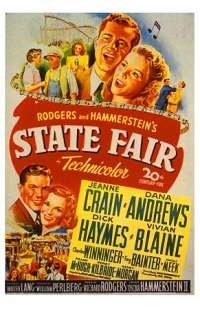State Fair

Our state fair is a great state fair,
Don't miss it! Don't even be late.
It's dollars to donuts that our state fair
is the best state fair in our state!
This 1945 movie musical, adapted from a novel by Philip Stong, bears the distinction of being Rodgers and Hammerstein's only movie not based a Broadway musical, although it spawned a Screen to Stage Adaptation in the mid-1990s.
As the Frake family prepares for a trip to Iowa's annual state fair, Abel Frake bets a friend that he and his family will achieve all the goals they set for the occasion. Abel has raised his pig, Blueboy, to become a contender for a blue ribbon. His wife, Melissa, has made mincemeat and pickles for cooking contests. Their son, Wayne, has brushed up his ring-tossing skills. Finally, Abel's and Melissa's daughter, Margy, hopes to find love during her temporary escape from mundane life on the farm. At the fair, Margy's dreams seem to start coming true when she meets a worldly reporter named Pat Gilbert. Wayne, meanwhile, has become attracted to a singer named Emily Edwards. As Abel, Melissa, and Wayne rack up prizes, an issue rises: can these new couples maintain their relationships after Iowa's state fair ends for another year?
A remake came out in 1962. The Frakes in this version attend Texas' state fair, where Wayne plans to win a car race, and Emily works as a showgirl with the last name Porter. This version also boasts six additional songs, written by Richard Rodgers.
- Beta Couple: Abel and Melissa most prominently, but Blueboy finds love as well.
- Book Ends: Shots of a billboard for the respective fair more or less begin and end each movie.
- The Cast Showoff: Ann-Margret as Emily Porter, to the extent where Wayne's and Emily's subplot threatens to overshadow Margy's and Pat's.
- Creator Backlash: Not too harsh an example, but Richard Rodgers expressed doubts that a Screen to Stage Adaptation of State Fair would turn out well, since he saw it as simply "a story about a bet". (For the record, the Broadway version ran three months.)
- Crowd Song: "It's a Grand Night For Singing"
- Disney Acid Sequence: "Isn't it Kinda Fun?" became one in the 1962 version.
- Driving a Desk: Used in scenes of the Frake family driving to and from the fair, as well as the scene of the 1945 version in which Margy and Pat meet while riding a roller coaster.
- The Faceless: Blueboy in the stage version, due to the impracticability of keeping a giant pig in a theater every night.
- G-Rated Sex:
- Some people watch the 1945's version scene in which Margy and Pat lie together in a field, and consider the implications that Margy lost her virginity offscreen.
- The 1962 version has a song about Wayne and Emily engaging in G-Rated Sex, "Willing and Eager".
- Have a Gay Old Time: "I feel so gay/in a melancholy way/that it might as well be Spring."
- Heroes Want Redheads: Emily has red hair in both versions.
- Hey, It's That Guy!: Margy's first boyfriend in the 1945 version? Owen Skywalker.
- "I Want" Song: "It Might As Well Be Spring"
- Incredibly Lame Pun: From the 1962 version: "It's Dallas to donuts that our state fair is the best state fair in our state!"
- Intoxication Ensues: After one of the judges at the cooking contest helps himself to leftovers of Melissa's mincemeat.
- Jerk with a Heart of Gold: Pat
- Jukebox Musical: The Broadway version bolsters the soundtrack with songs taken from R&H's most obscure musicals, as well as some Cut Songs from Oklahoma!
- Non-Singing Voice:
- The 1945 version had Margy portrayed by Jeannie Crain and dubbed by Louanne Hogan, who went on to dub any other movie in which Crain sang.
- The 1945 version also had Pat portrayed by Dana Andrews, and dubbed by someone else. Ironically, Andrews could sing well, but decided not to tell the studio. He hoped that this would make it easier for the singer they already hired to find work.
- The 1962 version had Margy portrayed by Pamela Tiffin and dubbed by Anita Gordon.
- Production Posse: The director of the 1945 version, Walter Lang, later directed the movie version of The King and I.
- Retronym: Some TV broadcasts of the 1945 version used the title It Happened One Summer, to avoid confusion with the remake. Eventually, the remake's critical and financial failures lessened the chance of people mistaking the '45 movie for it.
- Show Within a Show: In a move unusual for Rodgers and Hammerstein, half of the songs in the 1945 version are performed on a stage in front of fair-goers, like how people would sing them in real life.
- Someone's Touching My Butt: When the 1945 version's Margy and Pat ride a roller coaster car through a dark tunnel, one of the female passengers asks her boyfriend not to touch her, then shrieks.
- Spotlight-Stealing Squad: The 1962 version's Pat Boone and Ann-Marget as Wayne and Emily, respectively. This has to do in part with the fact Pamela Tiffin acts so bland as Margy. (Pat Gilbert's actor, Bobby Darin, has a tendency to steal the spotlight from her as well.)
- Too Many Cooks Spoil the Soup: Played with: Melissa refuses Abel's suggestion to sweeten the mincemeat with brandy, so Abel decides to add some without her noticing. After he leaves, Melissa decides to add some brandy herself. Even though the dish ends up having an abnormally high alcohol level, the judges still reward Melissa with a blue ribbon.